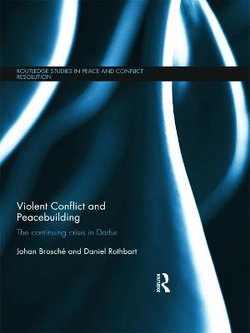The book explains the sources of the genocide in Darfur, and examines the situation from a novel perspective in which the crisis itself is defined as a complexity of four distinct, yet interlacing, conflicts. Within this framework, characterized as 'conflict-complementarity', the first conflict centers on issue of communal identities, such as long-standing disputes which generally break down along African/Arab lines, as well between different herder communities. The second arose out of political struggles between certain elite groups in Darfur that involve relations between different leaders of the resistance movements, which have prevented the disparate rebel movements from forming a united front against the government of Sudan. The third involves long-standing grievances of groups at the marginalized periphery against the elites at the national center of power. In this strain, a cadre of government officials and their collaborators has systematically exploited a politically fragmented periphery in order to maintain their position of power. This center-periphery relationship is intertwined with the current civil war between the North and the South of Sudan.
The extreme power imbalance that exists between the central government, on the one hand, and the peripheral movements and their constituencies on the other, has threatened the survival of the population at risk, most notably the Fur, Masalit, and Zaghawa tribes. The fourth conflict in the taxonomy consists of a cross-border war being waged between Chad and Sudan in which the government of each country supports the rebel movements of the rival country in an effort to topple each other's regimes, with devastating effects to Darfurians. The book also addresses the peace initiatives undertaken by the international community, especially the diplomatic efforts of neighboring African states, the United Nations, the United States, and the European Union. Indictments of key figures by the international Criminal Court are explored. Special attention is given to attempts to redress the fragmentation among the groups opposing the government through informal initiatives by unofficial interveners at the "track two" level of diplomacy. This book will be of interest to students of African politics, genocide, political violence, ethnic conflict, war and conflict studies, peacebuilding and IR.
- ISBN:
- 9780415689786
- 9780415689786
-
Category:
- Armed conflict
- Format:
- Hardback
- Publication Date:
-
28-06-2012
- Language:
- English
- Publisher:
- Taylor & Francis Ltd
- Country of origin:
- United Kingdom
- Pages:
- 192
- Dimensions (mm):
- 234x156x15mm
- Weight:
- 0.52kg
This title is in stock with our overseas supplier and should arrive at our Sydney warehouse within 3 - 5 weeks of you placing an order.
Once received into our warehouse we will despatch it to you with a Shipping Notification which includes online tracking.
Please check the estimated delivery times below for your region, for after your order is despatched from our warehouse:
ACT Metro: 2 working days
NSW Metro: 2 working days
NSW Rural: 2-3 working days
NSW Remote: 2-5 working days
NT Metro: 3-6 working days
NT Remote: 4-10 working days
QLD Metro: 2-4 working days
QLD Rural: 2-5 working days
QLD Remote: 2-7 working days
SA Metro: 2-5 working days
SA Rural: 3-6 working days
SA Remote: 3-7 working days
TAS Metro: 3-6 working days
TAS Rural: 3-6 working days
VIC Metro: 2-3 working days
VIC Rural: 2-4 working days
VIC Remote: 2-5 working days
WA Metro: 3-6 working days
WA Rural: 4-8 working days
WA Remote: 4-12 working days




Share This Book: